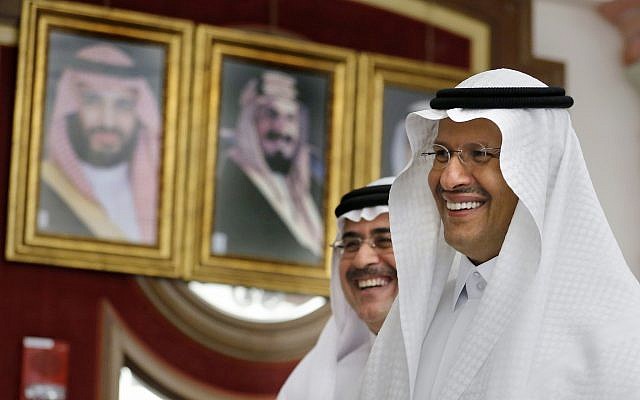Saudi Arabia joins US-led maritime coalition after attack on its oil production

DUBAI, United Arab Emirates (AP) — Saudi Arabia said Wednesday it joined a US-led coalition to secure the Mideast’s waterways amid threats from Iran after an attack targeting its crucial oil industry.
The kingdom’s decision to enter the International Maritime Security Construct came ahead of a planned visit by US Secretary of State Mike Pompeo. Saudi officials separately planned to share information about the weapons used to attack a Saudi oil field and the world’s largest crude oil processing plant Saturday.
Yemen’s Iranian-backed Houthi rebels have claimed the attack, but the US and Saudi Arabia say they suspect Iran carried out the assault. Iran denies that, though it comes amid a summer of heightened tensions between Tehran and Washington over its unraveling nuclear deal with world powers.
The state-run Saudi Press Agency carried a statement Wednesday morning quoting an unnamed official saying the kingdom had joined the International Maritime Security Construct.
Australia, Bahrain and the United Kingdom already have joined the mission.
“The kingdom’s accession to this international alliance comes in support of regional and international efforts to deter and counter threats to maritime navigation and global trade in order to ensure global energy security and the continued flow of energy supplies to the global economy and contribute to maintain the international peace and security,” the news agency said.
US military officials did not immediately respond to requests for comment from The Associated Press.
The coalition aims to secure the broader Persian Gulf region. It includes surveillance of the Strait of Hormuz, the narrow mouth of the Persian Gulf through which a fifth of the world’s oil travels, and the Bab el-Mandeb, another narrow strait that connects the Red Sea and the Gulf of Aden off Yemen and East Africa. Smaller patrol boats and other craft will be available for rapid response. The plan also allows for nations to escort their own ships through the region.
The US Navy already has sent Arleigh Burke-class guided missile destroyers to chokepoint positions, like either end of the Strait of Hormuz. There, they observe ship traffic and monitor for anything unusual as drones and other aircraft fly surveillance routes overhead.
The US blames Iran for the apparent limpet mine explosions on four vessels in May and another two in June sailing in the Gulf of Oman near the Strait of Hormuz, something Iran denies being behind. Iran also seized a British-flagged oil tanker and another based in the United Arab Emirates.
It’s unclear what role the kingdom will play in the coalition. Bahrain already serves at the headquarters of the US Navy’s 5th Fleet.
Wednesday’s announcement comes after Saudi Arabia’s energy minister said late Tuesday that more than half of the country’s daily crude oil production that was knocked out by an attack had been recovered and that production capacity at its targeted plants would be fully restored by the end of the month.
“Where would you find a company in this whole world that went through such a devastating attack and came out like a phoenix?” Energy minister Prince Abdulaziz bin Salman said about state-owned Saudi Aramco, which was the target of the attacks. His question to reporters, many of them Saudi, drew applause.
Prince Abdulaziz said Aramco will honor its commitments to its customers this month by drawing from its reserves of crude oil and offering additional crude production from other oil fields. He said production capacity would reach up to 11 million barrels a day by the end of September and 12 million barrels in November.
He said production at the Abqaiq processing facility is currently at 2 million barrels per day.
Oil prices spiked Monday, with benchmark Brent crude having the biggest percentage gain since the 1991 Gulf War. Prices dropped Tuesday around the Saudi announcement. Brent traded Wednesday morning around the same prices as the day before, with a barrel costing over $64.
Pompeo was due to land in the Red Sea city of Jiddah, where he was scheduled to meet with Saudi Crown Prince Mohammed bin Salman. Pompeo later will travel to the United Arab Emirates on Thursday to meet with Abu Dhabi’s powerful crown prince, Sheikh Mohammed bin Zayed Al Nahyan. Both nations are US allies and have been fighting against the Houthis in Yemen since March 2015.
The Saudi military planned to speak to journalists Wednesday in Riyadh to discuss the investigation into Saturday’s attack “and present material evidence and Iranian weapons proving the Iranian regime’s involvement.” It did not elaborate.
Marine Gen. Joseph Dunford, chairman of the Joint Chiefs of Staff, said Tuesday that US military experts were in Saudi Arabia working with their counterparts to “do the forensics on the attack” — gleaning evidence that could help build a convincing case for where the weapons originated.
On Wednesday, French President Emmanuel Macron’s office announced experts from his nation would be traveling to Saudi Arabia to help the kingdom shed light ” on the origin and methods” of the attacks. France has been trying to find a diplomatic solution to the tensions between Iran and the US, so any conclusion they draw could be used to show what a third-party assessed happened.
Read more: The Times of Israel